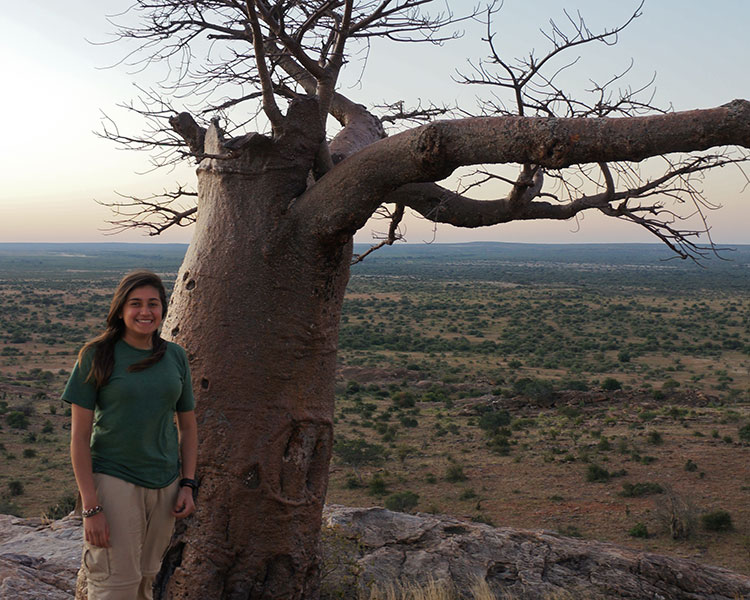
When Jazmin Castillo came to UNL as a freshman in 2013, she wanted to be a wildlife veterinarian.
"I knew I wanted to work with animals, and being a veterinarian seemed like a good choice for a career," said Castillo, a junior fisheries and wildlife major from South Sioux City.
But those plans changed when she embarked on an education abroad trip to Botswana in the summer of 2014.
"Everyone always dreams of visiting Europe when they're younger, but my dream was to visit Africa," Castillo said. "Not only did I learn about the different conservational issues in southern Africa, but it completely changed my career path. I went from wanting to be a wildlife veterinarian to wanting to be a conservation biologist."
While in Botswana, she worked alongside graduate students on their research projects. These experiences led Castillo to a major revelation.
"I fell in love with field work," she said.
Castillo returned to Botswana in 2015 to begin research of her own, which focuses on the distribution and abundance of spotted hyenas in the Northern Tuli game reserve.
"The project consisted of 19 calling stations each lasting about an hour, where we played the wonderful sound of a dying buffalo calf in the hopes of attracting predators," Castillo said. "My plan is to return to Botswana in 2016 and continue my second year of data collection. Our goal is to determine what, if any, factors affect the distribution or abundance of hyenas, and how this data can be used as a building block for further research within the reserve."
Castillo credits her time abroad as an important factor that has contributed to her growth as an individual.
"Being able to spend both of my past summers in Botswana has made me grow both academically and personally," she said. "You learn a lot about yourself when you spend a month in the African bush away from society."
SNR director John Carroll leads the Botswana trips and has assisted Castillo with her research.
He said that Castillo is an "outstanding student" who has demonstrated "a willingness to think and work outside the box."
"She came to me as a first-year student and said she wanted to go to Botswana with my team," Carroll said. "Within a very short period of time, she demonstrated in a variety of ways that she is a special student. By the time she is done as an undergraduate, she will have several years of field experience and publishable data."
For Castillo, acquiring that experience and knowledge is what it's all about. She is especially motivated by the fact that she's the first in her family to attend college.
"Being a first-generation student has been a constant challenge," she said. "It seems most of the students in SNR have a background in what they are studying. I grew up in a traditional Mexican household, so coming to Lincoln was a major culture shock."
Castillo said she sometimes faces obstacles in communicating her academic interests to her family.
"The language barrier tends to be an issue when trying to convey to my parents what I am studying," she said. "Some things don’t translate properly from English to Spanish."
But Castillo isn't letting those challenges get the best of her.
"I have used this as a motivation to work that much harder in learning about various environmental issues in order to be at the same level as my peers," she said. "Although my parents don't fully understand my major or career path, I know they are still proud of how much I have achieved."
And with plans to pursue a doctoral degree after she graduates in May 2017, Castillo's story is just getting started.
"My goal is to continue studying until I achieve my Ph.D.," she said. "I want to be a conservation researcher in another country and contribute to the field of science."
— Mekita Rivas, Natural Resources